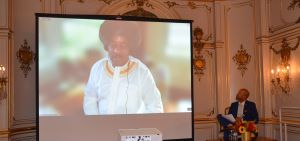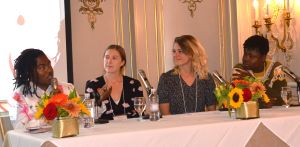Social workers who have paved a path for thousands of other social workers to the betterment of society were honored at a special ceremony hosted by NASW and the NASW Foundation at the historic Cosmos Club in Washington, D.C.
“The Future is Now: Meeting New Challenges & Building Community,” was the title of the gathering and included the induction of 25 social workers into the Social Work Pioneers® program for 2023.
Among the inductees was W.E.B Du Bois (1868-1963). He co-founded the NAACP and was among the first scholars to emphasize the person-in-environment (PIE) theory. He was the first African American to earn a doctorate from Harvard University and became a professor of history, sociology, and economics at Atlanta University.
W.E.B Du Bois’s great-grandson Arthur McFarlane II joined NASW CEO Dr. Anthony Estreet, PhD, MBA, LCSW-C, at the ceremony to discuss how Du Bois’s legacy continues to make an impact today.

Even though McFarlane was only an infant when he met with his famous great-grandfather, he has come to know the man from his relatives, books, and speeches.
“I am not just W.E.B Du Bois’s great-grandson, I am that for sure, but I am also all these other things in my life, all of these other things to be, being a dad, being a grandfather, really being a mentor to other young people,” said McFarlane, who has dedicated his career to the study of the social determinants of health. He joined Children’s Hospital Colorado in 2014 after retiring from the Colorado Department of Public Health and Environment, where he worked for 25 years.
“One of the issues for me is indigenous populations,” McFarlane explained.
He noted he has moved to a small town in Hawaii, where he has learned about the challenges facing the indigenous people of the islands.
“I am looking forward to spending the next 15 years learning about indigenous populations, especially in Hawaii,” he said.
Estreet said he had a recent visit to Alaska and learned how residents face environmental justice issues. He discovered that some of their communities are going under water due to climate change.
“We can no longer sit back and say ‘global warming is not a thing,’” Estreet said. “As we think about addressing and working with our indigenous populations, we have to really look at climate change and environmental justice as key cornerstones as we move with our agenda.”
Estreet asked McFarlane what his great-grandfather might say about the current state of race relations in the United States.
“(Du Bois) was never particularly satisfied with race relations in the United States, going back to when he was born to the day he died, the day before the March on Washington,” McFarlane said. “I can’t imagine he would be satisfied at this point in time.”
Du Bois’s son died simply of racism, McFarlane said. “His son died because his doctor wouldn’t treat a Black child in Atlanta.”
If a person looks at the social determinants of health numbers today, Du Bois would be just as dissatisfied today as when his son died, McFarlane said.
“Having said that, we have made progress, things have changed since he passed away in 1963,” McFarlane noted. “Lots of things have changed and a lot of things haven’t changed. We still have a lot of work to do.”
Today’s challenges are undoubtedly steep, McFarlane added. “But in many ways we have a lot of tools that he didn’t have in those days to begin to attack those challenges. I think social work, psychology - all those disciplines that work with people... will always be on the forefront on those kinds of battles.”
One issue that continues is voter suppression.
“I think (Du Bois) would want to encourage Black people and all people of color to make sure they understand the history of voter suppression, to understand what is has taken for people to have that vote to give... and the power of the individual vote,” McFarlane said.
It’s essential to vote, he said. “I think it’s important to understand what is on the ballot.”
The Next Generation
In addition to hearing from McFarlane, attendees listened to a welcome message from Yvonne Chase, PhD, president of NASW,
“I am especially proud of our colleagues whom we celebrate today,” Chase said.
While attendees gathered to honor the accomplishments of social workers, it was equally important to support the next generation of social workers, Chase said.
They will need to prepare to meet the challenges the nation is currently facing, such as the rise in hate and violence, social and political divisions, and the onslaught of anti-progressive laws that rolling back years of the work social workers have done across several states.
“We are equipped, I think, to answer these issues and address them,” Chase said. “And we need to have our voice heard. This is the time. We cannot be silent; things are occurring across our world that require a social work voice to be at the table.”
Carrying on with that theme, the event featured a student panel entitled “Exploring New Models for Problem-Solving,” moderated by Steven Hornberger, director of the Social Policy Institute at San Diego State University School of Social Work.

André Marcel Harris, MSW, a PhD student at the University of Houston, discussed the need for sickle cell disease awareness for social workers. He said disparities exist in treatment for disease based on race. “Over 90% who live with sickle cell disease are Black or Brown,” Harris said. “Knowing the history of social work, knowing where we are going in social work, it is imperative for those trained in social work to speak up for this population.”
Chelsea Bonosky, LMSW, author, activist, and a recent Fordham University graduate, spoke about several intervention programs, including “The Hands are for Holding®,” program a youth-centered workshop series that uses dance and movement to engage in conversations about healthy relationships, boundaries, respect, and choice in everyday interactions.
Jocelyn Smith, RD, CDCES, an MSW/MPH student at San Diego State University, discussed the silver tsunami that is approaching. By 2034, the number of older adults, for the first time in history, will eclipse the number of people under 18. “There is a lot of room for social workers in this arena,” Smith said.
Finally, Schai Schairer, MSW, executive director at Fighting Injustice Standing Together (FIST) and a recent graduate of Howard University, talked about the success of bringing spoken word poetry to incarcerated women. FIST aims to empower vulnerable women in prison and recently released from prison.
Gary Bailey, MSW, ACSW, former president of NASW, spoke about the recent 50th anniversary of the NASW Legal Defense Fund and its many essential activities over the decades to support social workers and their clients in legal battles.
The Premier Sponsors for the event were NASW Assurance Services and NASW.
The Lead Sponsors were Berkeley Social Welfare, Gary Bess Associates, and the UTA School of Social Work.
Faculty/deans from the following schools were also in attendance:
- University of California, Berkeley
- Howard University
- University of Georgia
- Columbia University
- Case Western Reserve University
- Catholic University
- Baylor University
- University of Pennsylvania
- Tuskegee University
- University of Maryland
- Morgan State University
- University of Connecticut
For a full list of the 2023 Social Work Pioneer inductees, visit www.naswfoundation.org/Our-Work/NASW-Social-Work-Pioneers